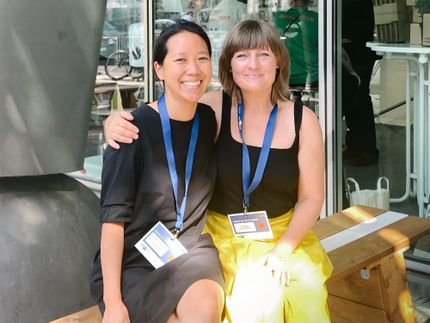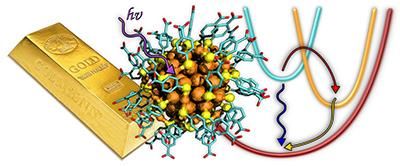Nina Energy: From ISC3 Start-up of the Month to global climate protection innovation
Sustainable Chemistry Changemakers: The path to a more sustainable future
Advertisement
In September 2019, Nina Energy (formerly Andes Bioenergy) was named Start-up of the Month by the International sustainable chemistry Collaborative Centre (ISC3) for its pioneering climate protection business idea. Founder Mario Salgado also received the "Elsevier-ISC3 Award for Entrepreneurship in Sustainable Chemistry". His company from Ecuador had developed an innovative pyrolysis technology for the production of biochar and renewable thermal energy from biomass waste from the agricultural industry. In addition to improving soil quality, biochar captures and stores carbon, which helps combat the climate crisis and generates carbon credits that can be traded on the open market. With ISC3 funding, the start-up has undergone a significant transformation, not only scaling up but also significantly developing its processes and team. Production capacities have increased fivefold and the overall positive impact on the climate has multiplied. Most recently, Nina Energy has gained another very well-known investor in the industry, Next Step and Carbon13. And there is yet another major success: The company was selected as one of eight start-ups for the Remove Global Accelerator program, which will give the company's development an additional boost.
More than five years after being named ISC3 Start-up of the Month, we spoke to founder Mario Salgado and Nina Energy co-founder Andres Novillo about the importance of sustainable chemistry, the challenges and highlights of the start-up's development and the role of support from the ISC3 Start-up Service.
What does sustainable chemistry mean to you?
Sustainable chemistry is a holistic approach that aims to improve the efficiency of using natural resources to meet human needs for chemical products and services while minimizing negative impacts on the environment, society and the economy. This addresses urgent global challenges such as climate change and resource scarcity. At Nina Energy, we see Sustainable Chemistry as a framework that helps us align the processes of our pyrolysis technology with broader sustainability goals. Accordingly, we take into account recent developments in sustainability in general, i.e. growth within biophysical limits. One clear measure in this regard is the calculation and analysis of the entire life cycle of our products - from the raw materials to the safe use of our biochar and bio-oil products.
Finally, we consider systems thinking - particularly socio-technical systems theory - in the development of our technology and in relation to agricultural systems, waste management and tackling the climate crisis. We also consider the principles of green chemistry when it comes to minimizing waste, improving energy efficiency and reducing environmental impact compared to conventional methods of biomass disposal and recycling.
Where do you stand today compared to when you were named Start-up of the Month?
Our core technology for the advanced conversion of residual biomass has matured significantly. We have moved from the first laboratory-scale trials to the operation of pilot plants. We are currently on the way to industrial-scale production. We have increased the production capacity of our reactors and plants fivefold and have carried out several iterations to optimize the pyrolysis gas conversion and other critical aspects of the pyrolysis process. Overall, we have significantly increased the efficiency and scalability of our biochar and bio-oil production processes, gained confidence in the environmental sustainability of our technology and built a solid customer base for our pyrolysis plants in Ecuador and in Southern Europe, particularly in Italy.
How have you benefited from the collaboration with the ISC3 and the support of the ISC3 Global Start-up Service?
The ISC3 Global Start-up Service has been critical to our growth and development as an emerging start-up in the thermochemical conversion sector. Our successes are a direct result of the support from ISC3 and the ongoing help we have received from the ISC3 network. Perhaps the most important benefit is the increased credibility our company has gained from the backing of the ISC3. Being recognized and supported by such a prestigious organization in the field of sustainable chemistry has opened doors for us with investors and accelerator programs. We have also benefited from the ISC3 Global Start-up Service in terms of professionalization. The mentorship and expert program has helped us refine our technology and business strategy and ensure we are on the right path to sustainable growth. Through the ISC3 events and connections, we have been able to expand our network of stakeholders in the sustainable chemistry space. The opportunity to participate in the ISC3 InvestorForum as part of the Impact Festival was a milestone. There, we presented our work to the German non-governmental organization Atmosfair, which led to face-to-face meetings in Berlin and subsequent visits by Atmosfair representatives to our facilities and sources of residual biomass in Ecuador. All of these events led to valuable partnerships and collaborations for future opportunities.
What were the highlights among the projects realized?
The successful scaling of our technology from pilot to industrial scale and the proof that our reactors can work in continuous operation are certainly the first to be mentioned. In addition, we were able to enter into important partnerships with agricultural cooperatives and industrial customers for biochar and bio-oil (pyrolytic liquids in general). The further development of our portfolio through new patent applications in connection with our optimized pyrolysis technology and our processes for pyrolysis gas treatment and use are further milestones. In addition, we have entered into a partnership with a major metal processing company in Spain to enable decentralized production of our technology. This enabled us to further establish ourselves on the European market. Last but not least, we concluded a contract with a large German non-governmental organization for the construction of a large-scale biochar production plant in one of Ecuador's leading FSC-certified forest production regions. This contract ensures that 70 percent of the investment and operating costs of the plant are covered by a non-repayable grant and guarantees the purchase of 100 percent of the carbon credits generated.
What does all this mean for your company?
On the one hand, a number of successes and achievements have significantly raised our profile and recognition in the carbon dioxide removal (CDR) industry. In addition, we have gained the trust of key stakeholders in the CDR industry while bringing our processes to full industrial maturity. Most importantly, a successful pre-seed funding round - led by our lead investor Next Step - has enabled us to further refine our business model and strengthen our technical capabilities.
Note: This article has been translated using a computer system without human intervention. LUMITOS offers these automatic translations to present a wider range of current news. Since this article has been translated with automatic translation, it is possible that it contains errors in vocabulary, syntax or grammar. The original article in German can be found here.
Other news from the department business & finance
Most read news
More news from our other portals
Something is happening in the chemical industry ...
This is what true pioneering spirit looks like: Plenty of innovative start-ups are bringing fresh ideas, lifeblood and entrepreneurial spirit to change tomorrow's world for the better. Immerse yourself in the world of these young companies and take the opportunity to get in touch with the founders.


























































